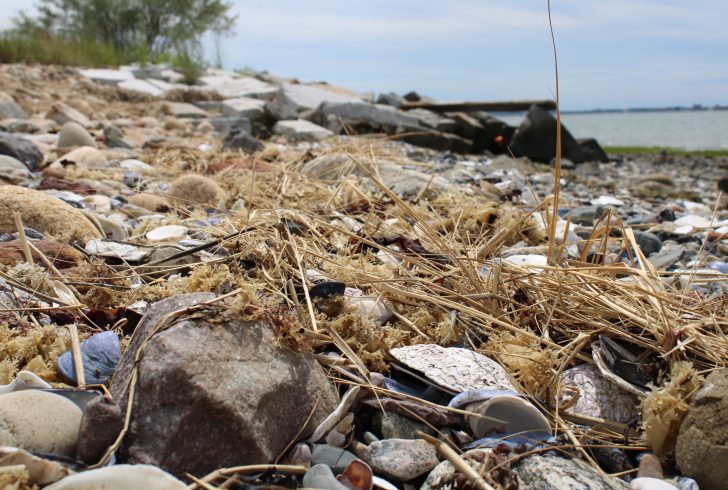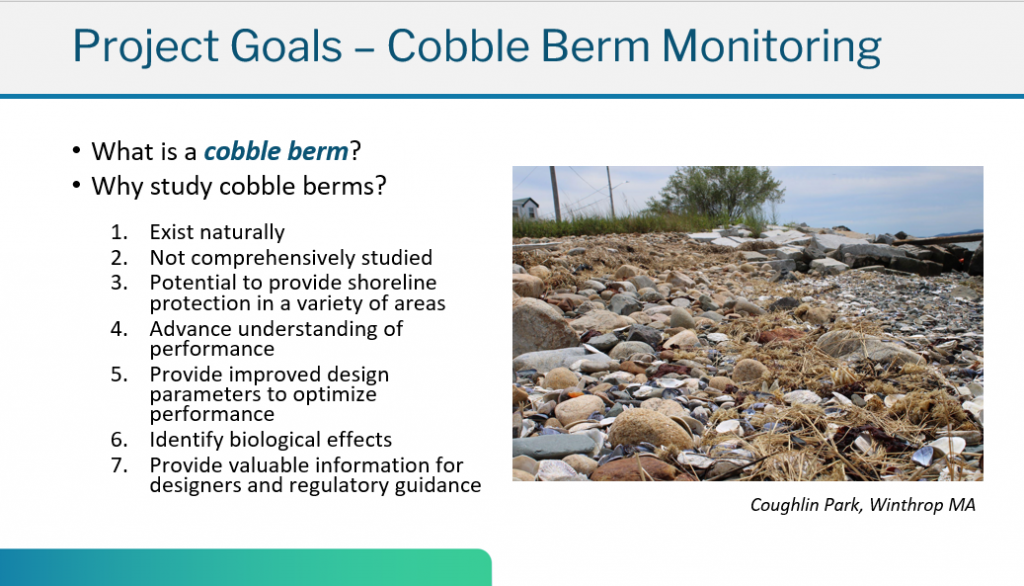Cobble Berm Monitoring Project Update: Focus Group Kickoff!


As part of a Massachusetts Coastal Zone Management (MACZM) Coastal Resiliency Grant, Woods Hole Group, the Stone Living Lab, and MACZM are developing a series of educational workshops and training sessions for municipal staff and employees. These workshops are focused on providing deeper information on nature-based approaches (NBA), and specifically cobble berms. A diverse group of municipal staff, spanning each of the CZM coastal regions (North Shore, Boston Harbor, South Shore, Cape Cod and Islands, and South Coastal) were invited to join a focus group to help determine the most useful information and types of engagement material that would be most beneficial to individual Towns and Cities along the coastline of Massachusetts. Utilizing the information gathered through the focus group, coupled with the results of monitoring six (6) cobble berms that have been constructed (or soon will be constructed) across the Commonwealth of Massachusetts, the project team will create outreach material and learning opportunities that address actual needs of municipalities. Two focus group meetings were conducted, on March 22nd and April 7th, 2023 consisting of representatives from the following municipalities and non-profit land owners: Winthrop, Rockport, Salem, New Bedford, Hull, Gloucester, Braintree, Chilmark, Mashpee, Plymouth, Duxbury, Boston, Scituate, Trustees of Reservations and Nantucket.

The focus group meetings consisted of an introduction to the overall project, the cobble berm project locations, and types of monitoring being conducted. Following this project overview, participants were asked to share experiences and provide responses to a series of key prompts:
The groups discussed various approaches to coastal resiliency, including green/grey infrastructure and seawalls, but acknowledged that funding is a major roadblock for many projects. Some members also noted the challenge of dealing with old school mentalities and lack of outreach to the community. Liability was discussed in relation to failed projects and the need for new technologies to comply with regulations. In particular, the lack of funding for maintenance of NBAs in grants was pointed out as a drawback of current MVP (and other) grant sources of funding. Some additional barriers mentioned included:
The groups also discussed the need for more success stories and education on coastal resiliency and suggested using MVP funding for maintenance in addition to implementation. Private sector involvement and outreach were also emphasized as important components of coastal resiliency efforts. There was excitement in response to project goals of eventually providing better guidance for NBAs in terms of location and design guidelines. Some additional potential solutions included:
Finally, the group brainstormed methods of outreach and education, including in-person events, workshops, YouTube videos (particularly utilizing site drone footage), and website/story maps. The idea of a professional certification program for coastal resiliency was also mentioned. Overall, there was more interest in materials that could be updated with new information rather than static materials such as brochures. Additional comments included:
The team is now planning and coordinating a series of in-person workshops and field trips this summer for municipal staff and resilience professionals. If you are interested in joining these trips or want to find out more about the project, contact Rebecca Shoer rshoer@bostonharbornow.org or sign up for our mailing list below!